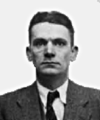Template:Selected anniversaries/February 12: Difference between revisions
No edit summary |
No edit summary |
||
| (One intermediate revision by the same user not shown) | |||
| Line 76: | Line 76: | ||
||1929: Mathematician and academic Alexei Kostrikin born. He will specialize in algebra and algebraic geometry, making important contributions to the Burnside problem; he also wrote widely used textbooks. Pic search. | ||1929: Mathematician and academic Alexei Kostrikin born. He will specialize in algebra and algebraic geometry, making important contributions to the Burnside problem; he also wrote widely used textbooks. Pic search. | ||
||1935: USS ''Macon'', one of the two largest helium-filled airships ever created, crashes into the Pacific Ocean off the coast of California and sinks. | ||1935: USS ''Macon'', one of the two largest helium-filled airships ever created, crashes into the Pacific Ocean off the coast of California and sinks. | ||
| Line 88: | Line 86: | ||
||1939: S. P. L. Sørensen dies ... chemist and academic ... famous for the introduction of the concept of pH, a scale for measuring acidity and alkalinity. Pic. | ||1939: S. P. L. Sørensen dies ... chemist and academic ... famous for the introduction of the concept of pH, a scale for measuring acidity and alkalinity. Pic. | ||
||1946: World War II: Operation Deadlight ends after scuttling 121 of 154 captured U-boats. | ||1946: World War II: Operation Deadlight ends after scuttling 121 of 154 captured U-boats. | ||
| Line 106: | Line 102: | ||
File:Oskar_Anderson.jpg|link=Oskar Anderson (nonfiction)|1960: Mathematician and statistician [[Oskar Anderson (nonfiction)|Oskar Anderson]] dies. Anderson made important contributions to mathematical statistics and econometrics. | File:Oskar_Anderson.jpg|link=Oskar Anderson (nonfiction)|1960: Mathematician and statistician [[Oskar Anderson (nonfiction)|Oskar Anderson]] dies. Anderson made important contributions to mathematical statistics and econometrics. | ||
File:Venera 1.jpg|link=Venera 1 (nonfiction)|1961: Spacecraft [[Venera 1 (nonfiction)|Venera 1]] launched. Venera will become the first man-made object to fly-by another planet by passing Venus (although it will lose contact with Earth and not send back any data). | File:Venera 1.jpg|link=Venera 1 (nonfiction)|1961: Spacecraft [[Venera 1 (nonfiction)|Venera 1]] launched. Venera will become the first man-made object to fly-by another planet by passing Venus (although it will lose contact with Earth and not send back any data). | ||
| Line 118: | Line 112: | ||
||1980: Carl Einar Hille dies ... mathematics professor and scholar. Hille authored or coauthored twelve books mathematical books and a number of mathematical papers. Pic. | ||1980: Carl Einar Hille dies ... mathematics professor and scholar. Hille authored or coauthored twelve books mathematical books and a number of mathematical papers. Pic. | ||
File:Charles Critchfield ID badge.png|link=Charles Critchfield (nonfiction)|1994: Mathematical physicist [[Charles Critchfield (nonfiction)|Charles Critchfield]] dies. Critchfield worked on the Manhattan Project, designing and testing the "Urchin" neutron initiator which provided the burst of neutrons that kick-started the nuclear detonation of the Fat Man weapon. | File:Charles Critchfield ID badge.png|link=Charles Critchfield (nonfiction)|1994: Mathematical physicist [[Charles Critchfield (nonfiction)|Charles Critchfield]] dies. Critchfield worked on the Manhattan Project, designing and testing the "Urchin" neutron initiator which provided the burst of neutrons that kick-started the nuclear detonation of the Fat Man weapon. | ||
Latest revision as of 18:54, 26 January 2022
1912: Mathematician and logician Hans Hermes born. Hermes will contribute to the foundations of mathematical logic, and pioneer the concept of the Turing machine as a measure of predictability.
1914: Mathematician and academic Hanna Neumann born. Neumann will contribute to group theory, co-authoring the important paper Wreath products and varieties of groups (with her husband Bernhard and eldest son Peter), and authoring the influential book Varieties of Groups (1967).
1916: Mathematician, philosopher, and academic Richard Dedekind dies. Dedekind made important contributions to abstract algebra (particularly ring theory), algebraic number theory and the definition of the real numbers.
1935: Physicist and engineer Robert Van de Graaff receives a patent for his Electrostatic Generator design (U.S. No. 1,991,236), able to generate direct-current voltages much higher than the 700,000-V which was the state of the art at the time using other methods.
1947: Chemist and academic Moses Gomberg dies. Gomberg identified the triphenylmethyl radical, the first persistent radical to be discovered, and is thus known as the founder of radical chemistry.
1959: Singer, songwriter, multi-instrumentalist, and alleged criminal mastermind Skip Digits uses high-energy literature techniques to record his hit song "Klepsydra".
1960: Mathematician and statistician Oskar Anderson dies. Anderson made important contributions to mathematical statistics and econometrics.
1961: Spacecraft Venera 1 launched. Venera will become the first man-made object to fly-by another planet by passing Venus (although it will lose contact with Earth and not send back any data).
1994: Mathematical physicist Charles Critchfield dies. Critchfield worked on the Manhattan Project, designing and testing the "Urchin" neutron initiator which provided the burst of neutrons that kick-started the nuclear detonation of the Fat Man weapon.








